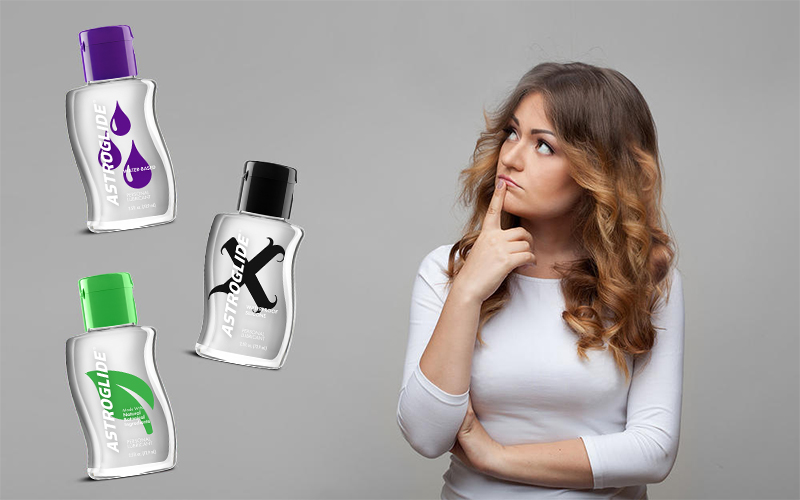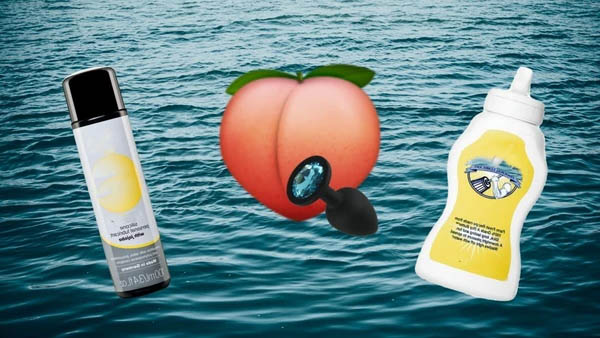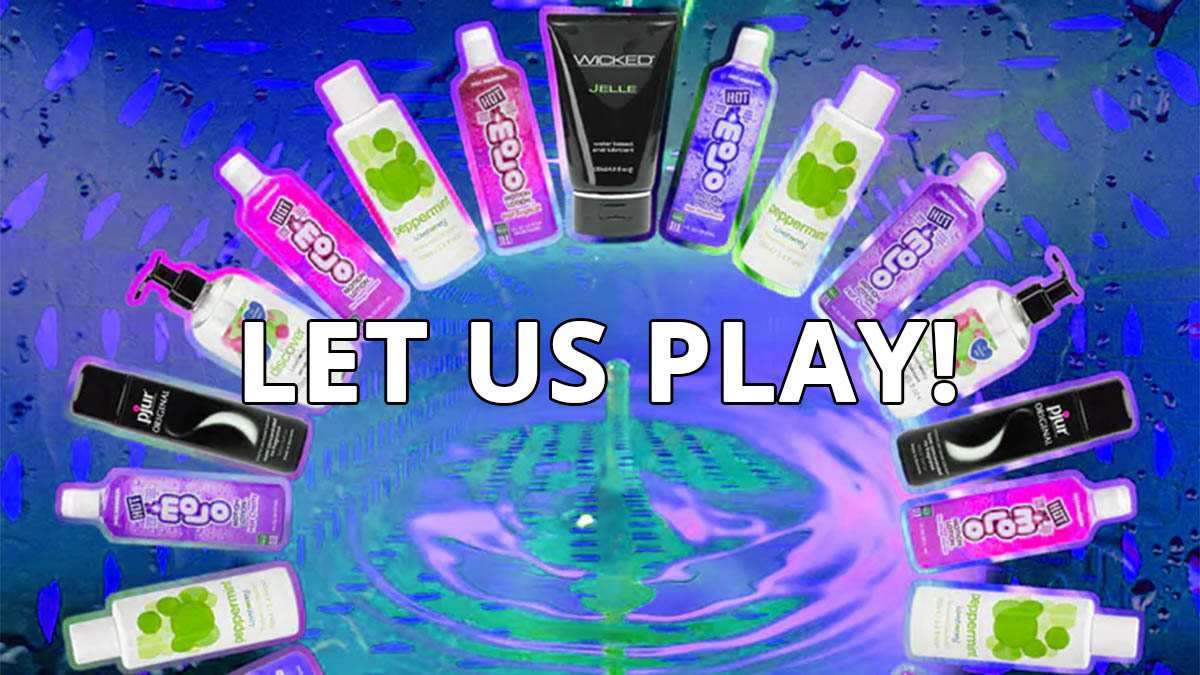Everything You Need To Know About Lubes (Before Buying)
As a cam model, chances are you’ve used lubricants at one point or another. If not, then fear not, you’ll be an expert after reading this. Sure, it’s considered a taboo topic for many people, but lubes are a great way to make things, well, slippery and more pleasurable for you and your partner. It’s what many cam girls would consider a must-have in the arsenal of camming products. I promise, they’re not wrong! The common misconception is that sex lubricants are a way to “spice things up when things are getting stale,” but this is not the case. Consider them an aid, versus a way to spice things up.
Let’s Reduce The Friction And Talk Lube For Cam Girls & Sexual Pleasure
Oh, and before kick starting this, I need to stress that saliva is not a substitute for lube. Sex lubricants play a much more fundamental role, and here I’ll talk at length about everything you need to know about lube. I’ll answer every lube-related question: What is lube? Who should use lube? What are the different types of lube? Which type of lube to use? Is using lube safe with sex toys? And much more in our deep dive into the wonderful world of lubrication in the bedroom.
What The Heck Is Lube?
First, let’s start with the basic definition of a sexual or a personal lubricant. The official scientific definition for lubricant states that a lubricant is a substance that helps reduce friction between surfaces in mutual contact. In terms of personal lubes, these are substances that increase the slipperiness during a sexual act. That act can be you using a toy while streaming live on Camsoda. It can also be in regards to pleasuring your partner and yourself during foreplay, sexual intercourse or more.
A well-lubricated area is less prone to skin tears, breakage, or friction burns, and most people use lube during masturbation, foreplay, and different types of sex. People can use lubes for many reasons. The main use of lube is for areas that don’t produce natural lubrication, for example, anal. Another everyday use for lube is to add more lubrication where not enough natural lubricant is produced. Plus, many people add lube to make things much more slippery and more fun.
Who Should Use Lube?
There is no rule on who should or should not use lube. You can use lube during solo masturbation sessions or when engaging in sexual activities with your partner. If your body is not producing enough natural lubrication for some reason, it’s better to add lube than to suffer through the friction and the feeling of tightness.
I can’t stress enough that there is no shame in using lube. Nearly every cam girl on the planet is using it and you should too. Even though you can be extremely attracted to your partner, there are reasons why your vagina can’t produce enough natural lubrication. The obvious answer is to use lube. But this is not the only case you should use it, as even scientists agree that lube makes all sorts of sexual acts more pleasurable.
I think that people should forgo the stigma that using lube is for people who are not aroused. Instead, think of lube as encouragement for your body and improving your sex life. Lube is for everyone, but you need to be careful of the type you use, as there are plenty of lube types for different applications and situations. More on this below, but first, I need to talk more about the basics of this wonderful product and when it should be used.
When To Use Lube?
Of course, the wetter, the better, thus lube. Lube is so much more than simply enhancing wetness. As I’ve stated above, lube is for everybody. Even if you are enjoying a solo masturbation session, lube can make things slippery and fun. For women, lube can make things wetter during masturbation, and for men, lube makes things effortlessly glide.
Lube can intensify sexual arousal and increase pleasure. It can make sex last longer, and make the use of sex toys much easier and more fun. Flavored lubricants can add to the excitement and enjoyment of oral sex. I can go on about when you should use lube, as there are many more options where this sexual assistant can be practical and useful.
For people engaging in anal sex, lube is a necessity. The anal area does not have natural lubrication, so the use of lube brings the slipperiness needed to make things comfortable and enjoyable. Without enough lube, engaging in anal play would not be pleasurable but insanely uncomfortable and often painful.
Another act where lube is an absolute necessity is when using sex toys. Engaging in any fetish or play that includes adult toys is much smoother with the use of lube. Below I’ll talk more about the types of lube you can use with different sex toys. Yes, it actually does matter, as strange as that sounds.
I also need to mention that in some professions, lube is a godsend. For example, cam girls who need to perform in front of a camera can use lube to make things pleasurable and much easier. Camming can be a fun yet demanding profession, as the audience expects a performance, but every camgirl cannot always be “up for it.” So, a little lube can make everything better for both parties – the cam model can perform better, and the viewers will get the show they expect.
My point is that people, in general, should not shy away from the use of lube in their sexual play, as it makes things glide, increases sexual pleasure, and enables the use of sex toys that would otherwise be uncomfortable to use.
How To Use Lube?
The use of lube is straightforward – you apply it to the area that needs lubrication. Pour some lube on your fingertips, use them to spread the lube on your body, or pour it directly onto the body part you wish to lubricate. The same goes for sex toys – you can apply the lube to the toy or apply the lube to your body and rub the toy over it to lubricate it. There are no rules, whatever works for you best.
Lube comes in different containers, and these have a significant role in how it is dispensed. Some lubricants come in small packets for single-use, but these can be tricky to open with slippery hands. Also, you can tear the packet in the heat of the moment, spilling the lube on unwanted places.
Most come in bottles or squeeze-type tubes. The application method of the squeeze-type lube is simple – squeeze the required amount on your hand and rub it where you need it. The lube in a bottle is a bit tricky to apply, as you can’t measure the amount that pours out. Many brands offer lube in bottles with a dispenser pump, and in my experience, this is by far the easiest application method.
What Should Not Be Used As Lube?
Many times, you can find yourself out of lube when you need it the most. However, if this happens, you should not be tempted to use some everyday household items as lube. While there are some things you can use as lube (in exceptional cases), please refrain from using everyday items as these are not intended for this application and can often do more harm than good. Here are the things you should NEVER use instead of lube:
- Body Moisturizers
- Cooking Oil
- Baby Oil
- Vaseline
- Honey/Syrup
- Butter/Margarine
- WD-40
These items are not suited for the sensitive and tender lining of the vagina, penis, and anal area. If you use some of these items, you risk inflammation and irritation of the skin, bacterial infection, and other health problems. The items I’ve listed here have a complex chemical composition, are full of parabens, alcohol, and other harmful components.
These are not suitable for use with condoms, as most of the ingredients can react with latex and cause it to disintegrate. Such an action can lead to other problems, like the risk of sexually transmitted diseases or unwanted pregnancy.
You can see the implications related to the use of household items as sexual lubricants. Make sure you stock up on your preferred sex lube and never risk your health for the sake of unhealthy experimenting with items unsuitable for sex lube use.

What Is Lube Viscosity?
We are again talking about a technical term, but lube viscosity is essential for the level of slipperiness you are after. In more tech talk, lube is used to diminish the friction between surfaces, and viscosity measures the resistance of the lube or the “thickness” of the lube.
In simpler words: the more viscous the lube is, the more difficult it will be to spread it, and things will slide more difficult over it and can become sticky without being enjoyable (think honey or syrup). The less viscous a lube is, the more slippery it will be, and the easier things will slide and glide.
The viscosity of the lube depends on its composition. The water-based lubricants have low viscosity and make things glide more effortlessly, but these tend to evaporate more quickly, needing to be reapplied more often. The thicker lubes have higher viscosity and don’t need to be reapplied but don’t provide such an easy glide as water-based lubes.
Types Of Lube and Body Compatibility
There are several types of personal lubricants separated into several categories:
- Water-based
- Oil-based
- Silicone-based
- Hybrid
- Flavored
- Special effects lubricants
These have different compositions that may not be compatible with every user. Many people who have sensitive skin may find some of the ingredients irritating and uncomfortable. The ingredients that can irritate are:
Glycerin/Glycerol – This is a type of sugar-derived alcohol often found in many cosmetic products. In some cases, it has been shown to cause irritation and inflammation to the vaginal walls, and in more severe cases, even pain and yeast inflammation.
Parabens – Another commonly used preservative found in many cosmetic products, including lubes; paraben can cause increased sensitivity and irritation.
Mineral Oil and Petroleum Jelly – These two ingredients commonly found in oil-based cosmetics are not very suited for internal use. They can cause bacterial infection in the vagina, pain, and irritation.
Artificial Fragrances and Flavors – These add smell and taste to cosmetics products but are not suited for internal use. These can irritate the sensitive skin on the vagina and penis. It is my suggestion to avoid them as much as possible.
As a general rule, it is better to avoid using personal lubricants for internal and external lube that contain glycerin, parabens, artificial fragrances, and flavors, just to be on the safe side.
Keep track of the expiry date of lubes, just like you would with any other product intended for personal use. I suggest you throw away any expired lube, as you risk a lot of discomfort using old, out-of-date personal lube.
What Types Of Lube To Avoid?
I noted above that you should be careful when selecting lube, as it is applied to the most sensitive parts of your body, both externally and internally. While they can provide fun, the flavored lubricants contain many artificial ingredients that irritate the skin and cause pain.
While here, let me mention how important it is to avoid warming and tingling lubes. These often always contain artificial ingredients that are not supposed to come in contact with intimate parts of the body. I suggest you avoid lubricants with numbing agents, especially for anal sex or play, as these numb the area, and you can inadvertenly end up getting hurt.
To test if the lube is compatible with your skin, rub some of it on the inside of your elbow. If there is no reaction, you should test it on the outside of your vulva or your penis before you go and apply it for internal use.

What To Use With Sex Toys
One of the primary uses of sex lube is the use with sex toys. But what type of lube is compatible with what type of toy? The water-based lubricants are compatible with all sorts of sex toys, as they are, after all, water-based. These provide an excellent slippery feel and get absorbed in the skin, not causing discomfort.
However, if you use large toys or engage in a particularly long session, you will need to reapply the lube as it tends to dry as the water evaporates. Also, water-based lubes are perfect to use with condoms, as they don’t interact with latex but are not suitable for use in water, as they wash off easily.
The oil-based lubes can be used with larger toys that need extra slipperiness. The oil-based lubricants don’t interact adversely with silicone-based toys but tend to dissolve vinyl and latex. So, if you do use condoms, then stay away from oil-based and petroleum-based lubricants. Oil-based lubes can be challenging to wash off sheets and clothes, but on the flip side, once you apply them, you can enjoy a longer time without the need to reapply.
The silicone-based lubricants offer the best of both worlds – they are slippery and last longer and are safe to use with condoms. Plus, as silicone is inert, the silicone-based lube is hypoallergenic and does not cause inflammation.
However, some silicone-based lubricants can deteriorate the surface of some sex toys, but not all. Make sure you are using a genuine silicone toy for no adverse effects. To be on the safe side, read the label on the pack. Also, silicone-based lubes are more difficult to wash off, so you can end up with a “sticky” feeling for hours after.
The Types Of Lube To Consider
The lubricants on the market today can be separated into several base categories:
- Water-based lubricants
- Oil-based lubricants
- Silicone-based lubricants
- Hybrid lubricants
- Anal lubricants
- Water-based sex lubricants
This is a product that has water as its base. Other ingredients are added to improve the slipperiness and longevity of the water-based lube, making it more viscous and, in some cases, making it opaque instead of transparent.
The watr-based sex lube can be used with latex and latex-free condoms and all types of sex toys. It is easy to wash off and does not stain the skin and clothes. The only downsides are that it can’t be used in water and requires additional application if you engage in a more extended solo or sex session.
Oil-based lubricants
Oil-based lubricants are an excellent option for people that don’t use condoms, as oil can destroy latex. But oil-based lubes are safe to use with silicone toys and provide a good amount of slipperiness. These have a moisturizing effect on the skin and can also be used for massage to increase intimacy and improve foreplay. These can be used in water, as they don’t wash off but can stain clothes and sheets.
In some cases, the oil-based lubricants can solidify and may need warming before you can apply them. The most common and best oil-based sex lubricants use coconut oil, avocado oil, olive oil, Vitamin E oil, and similar natural oils. I need to note here that you should avoid the oil-based lubricants that contain mineral oil and petroleum jelly, as these are irritating to the lining of the vagina and the skin of the penis.
Silicone-Based Lubricants
Silicone-based lubricants are made with silicone. These may contain some other ingredients, but the main ingredient is always silicone, which is hypoallergenic and non-water soluble. The silicone lubricants provide a good amount of slipperiness and don’t evaporate or deteriorate due to friction.
These are safe to use with condoms and silicone-based toys, but not other types of toys like rubber, PVC, vinyl, and the like. Still, the silicone lubricants can stain clothes and sheets and wash the skin and sex toys with soap and water. But, you can use a silicone lubricant when getting frisky in the water.
Hybrid Lubes
Hybrid lubricants are a combination between water and silicone-based lubricants, and these provide the best of both worlds – long-lasting effect and the slipperiness of water-based lube. These are safe to use with condoms and all sorts of toys and are easier to wash off than regular silicone-based lubes.
Since the sex toy industry lacks standards, there is no strict recipe for how these are made. Before you go and buy one, check several brands’ ingredients and look for positive online reviews. You can use these for a more intense sex play, as they don’t dry like water-based lubes and can be used for anal sex.
Anal Lubricants

While you can use any type of lube for anal play, it is much better to use a lubricant specifically designed for this use. These can be water-based, oil-based, or silicone-based but are much thicker (more viscous) than regular lubes; they have a gel-like consistency and are usually opaque in color.
The opaqueness is there so you can see where you’ve applied the lube and not miss a spot and cause discomfort during anal play. The thicker lubricant stays on much longer, helps the insertion of anal sex toys, and helps the glide for anal sex.
Conclusion: Use Lube and Live A Better Life…
There is no unique best lube on the market now. It depends on the use and personal preference. I hope that I’ve covered all the pressing questions you have about lubricants. Follow our blog for more updates on this and similar topics.
















